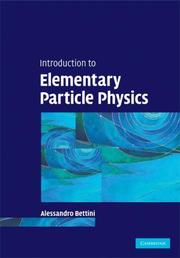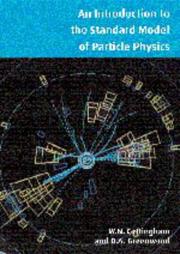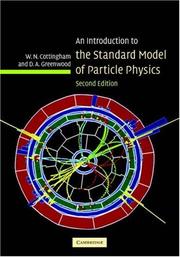| Listing 1 - 6 of 6 |
Sort by
|

ISBN: 9780521880213 0521880211 9780511809019 9781107406094 9780511649912 0511649916 0511400594 9780511400599 9780511402616 0511402619 0511809018 1107406099 1107184258 1139814230 0511574096 0511398751 Year: 2008 Publisher: Cambridge Cambridge University Press
Abstract | Keywords | Export | Availability | Bookmark
 Loading...
Loading...Choose an application
- Reference Manager
- EndNote
- RefWorks (Direct export to RefWorks)
The Standard Model is the most comprehensive physical theory ever developed. This textbook conveys the basic elements of the Standard Model using elementary concepts, without the theoretical rigor found in most other texts on this subject. It contains examples of basic experiments, allowing readers to see how measurements and theory interplay in the development of physics. The author examines leptons, hadrons and quarks, before presenting the dynamics and the surprising properties of the charges of the different forces. The textbook concludes with a brief discussion on the discoveries of physics beyond the Standard Model, and its connections with cosmology. Quantitative examples are given, and the reader is guided through the necessary calculations. Each chapter ends in the exercises, and solutions to some problems are included in the book. Complete solutions are available to instructors at www.cambridge.org/9781107406094.
Elementary particles --- Standard model (Nuclear physics) --- Standard model (Nuclear physics). --- Nuclear models --- Nuclear reactions

ISBN: 0521588324 0521581915 Year: 2005 Publisher: Cambridge Cambridge University Press
Abstract | Keywords | Export | Availability | Bookmark
 Loading...
Loading...Choose an application
- Reference Manager
- EndNote
- RefWorks (Direct export to RefWorks)

ISBN: 9780521852494 0521852498 9780511791406 9780511568244 0511273770 9780511273773 0511271360 9780511271366 0511649061 9780511649066 0511791402 0511272987 9780511272981 1281836397 9781281836397 1107165415 9786611836399 0511438869 1139814117 051156824X Year: 2008 Publisher: Cambridge Cambridge University Press
Abstract | Keywords | Export | Availability | Bookmark
 Loading...
Loading...Choose an application
- Reference Manager
- EndNote
- RefWorks (Direct export to RefWorks)
The second edition of this introductory graduate textbook provides a concise but accessible introduction to the Standard Model. It has been updated to account for the successes of the theory of strong interactions, and the observations on matter-antimatter asymmetry. It has become clear that neutrinos are not mass-less, and this book gives a coherent presentation of the phenomena and the theory that describes them. It includes an account of progress in the theory of strong interactions and of advances in neutrino physics. The book clearly develops the theoretical concepts from the electromagnetic and weak interactions of leptons and quarks to the strong interactions of quarks. Each chapter ends with problems, and hints to selected problems are provided at the end of the book. The mathematical treatments are suitable for graduates in physics, and more sophisticated mathematical ideas are developed in the text and appendices.
Elementary particles --- Standard model (Nuclear physics) --- Standard model (Nuclear physics). --- Particles (Nuclear physics). --- Particules (Physique nucléaire) --- Particles (Nuclear physics) --- Elementary particles (Physics) --- High energy physics --- Nuclear particles --- Nucleons --- Nuclear physics --- Nuclear models --- Nuclear reactions
Book
ISBN: 0471906506 0471105090 9780471105091 9780471906506 Year: 1984 Publisher: Chichester
Abstract | Keywords | Export | Availability | Bookmark
 Loading...
Loading...Choose an application
- Reference Manager
- EndNote
- RefWorks (Direct export to RefWorks)
Quantum mechanics. Quantumfield theory --- 530.145 --- #WSCH:AAS2 --- Quantum theory --- Quantum field theory. --- Physics --- Quantum field theory --- 530.145 Quantum theory --- $ Weak interactions(Leptonic-) --- $ Quantum electrodynamics(Radiative Corrections) --- $ Feynman graphs --- $ Scattering matrix expansion --- $ Electroweak interactions(Standard Model) --- $ Quantum electrodynamics(Regularization) --- $ Weak interactions(Gauge Theories) --- $ Quantum electrodynamics --- $ Quantum field theory --- $ Symmetry breaking in particle physics --- $ Photon covariant theory --- $ Dirac's theory --- $ Klein Gordon equation --- Théorie quantique des champs --- Weak interactions(Leptonic-) --- Quantum electrodynamics(Radiative Corrections) --- Feynman graphs --- Scattering matrix expansion --- Electroweak interactions(Standard Model) --- Quantum electrodynamics(Regularization) --- Weak interactions(Gauge Theories) --- Quantum electrodynamics --- Symmetry breaking in particle physics --- Photon covariant theory --- Dirac's theory --- Klein Gordon equation
Periodical
ISSN: 11266708 10298479 Year: 1997 Publisher: Bristol : Heidelberg : IOP Pub., Springer Berlin
Abstract | Keywords | Export | Availability | Bookmark
 Loading...
Loading...Choose an application
- Reference Manager
- EndNote
- RefWorks (Direct export to RefWorks)
Physics --- Particles (Nuclear physics) --- Particules (Physique nucléaire) --- Periodicals --- Périodiques --- Mathematical Sciences --- Mathematical Physics --- General and Others --- Elementary particles (Physics) --- High energy physics --- Nuclear particles --- Nucleons --- elementary particle physics --- high-energy physics --- astroparticle physics --- collider physics --- quantum field theory --- standard model phenomenology --- Particules (Physique nucléaire) --- Nuclear physics --- Fysica --- Partícules (Física nuclear)
Periodical
ISSN: 14346044 14346052 Year: 1998 Publisher: Heidelberg : Springer-Verlag Heidelberg,
Abstract | Keywords | Export | Availability | Bookmark
 Loading...
Loading...Choose an application
- Reference Manager
- EndNote
- RefWorks (Direct export to RefWorks)
The European Physical Journal C (EPJ C) presents new and original research results in theoretical physics and experimental physics, in a variety of formats, including Regular Articles, Reviews, Tools for Experiment and Theory, Scientific Notes and Letters. The range of topics is extensive : Theoretical Physics, Electroweak interactions and QCD, Nonperturbative strong interactions, Heavy flavor physics Lattice field theory, High temperature QCD and heavy-ion physics, Beyond the standard model, Astroparticle physics and cosmology, Quantum field theories and string theories, Computational algorithms and tools / Experimental Physics, Hadron and lepton collider physics, Lepton nucleon scattering, High energy nuclear reactions, Standard model precision tests, Search for new physics beyond the standard model, Heavy flavour physics, Neutrino physics High energy cosmic rays, Dark matter searches, Particle detector developments, Accelerator physics, Computational methods and analysis tools.
Elementary particles --- Quantum mechanics. Quantumfield theory --- Particles (Nuclear physics) --- Field theory (Physics) --- Particules (Physique nucléaire) --- Champs, Théorie des (Physique) --- Periodicals --- Périodiques --- Periodicals. --- Nuclear physics --- Particules (Physique nucléaire) --- Champs, Théorie des (Physique) --- 33.50 physics of elementary particles and fields: general --- Physics --- Astrophysics --- Nuclear Physics --- Optics & Opto Electronics --- Particle Physics --- General and Others --- Physics. --- Particle Physics. --- Périodiques --- EBSCOASP-E EJINGEN EJPHYSI EPUB-ALPHA-E EPUB-PER-FT SPRINGER-E --- elementary particle physics --- high-energy physics --- astroparticle physics --- collider physics --- quantum field theory --- standard model phenomenology --- Classical field theory --- Continuum physics --- Continuum mechanics --- Kwantummechanica. Gekwantiseerde velden --- Elementaire deeltjes --- Partícules (Física nuclear) --- Física nuclear --- Camps, Teoria dels (Física) --- Física de partícules. --- Teoria de camps (Física) --- Física nuclear.
| Listing 1 - 6 of 6 |
Sort by
|

 Search
Search Feedback
Feedback About UniCat
About UniCat  Help
Help News
News